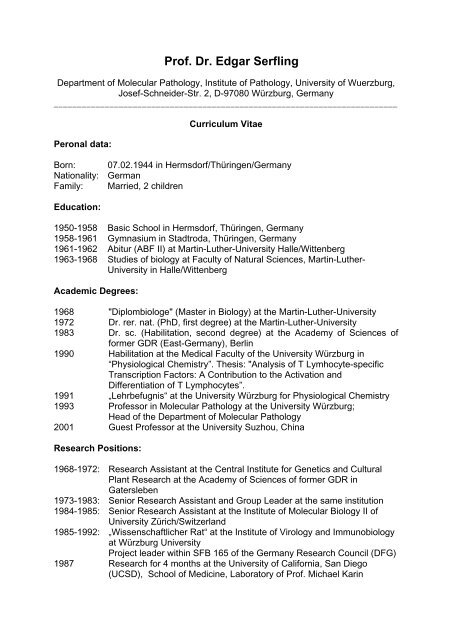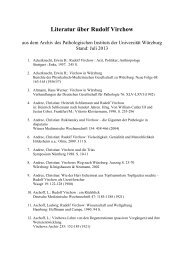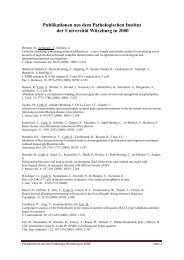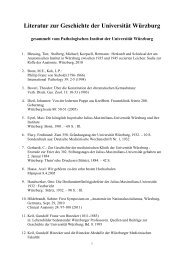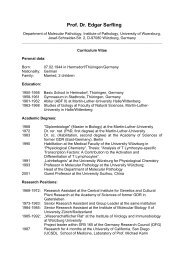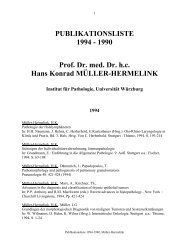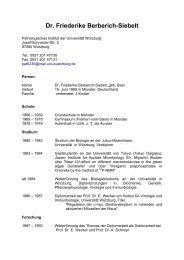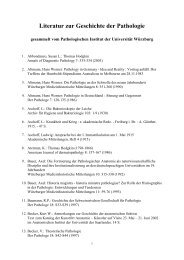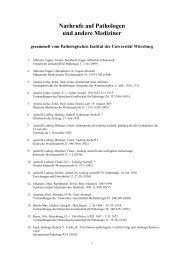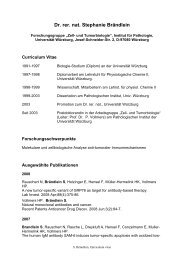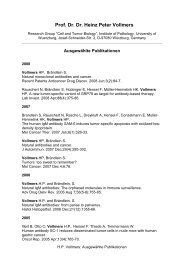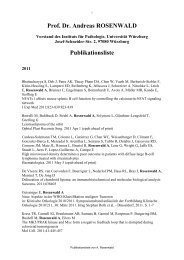Prof. Dr. Edgar Serfling
Prof. Dr. Edgar Serfling
Prof. Dr. Edgar Serfling
You also want an ePaper? Increase the reach of your titles
YUMPU automatically turns print PDFs into web optimized ePapers that Google loves.
<strong>Prof</strong>. <strong>Dr</strong>. <strong>Edgar</strong> <strong>Serfling</strong><br />
Department of Molecular Pathology, Institute of Pathology, University of Wuerzburg,<br />
Josef-Schneider-Str. 2, D-97080 Würzburg, Germany<br />
__________________________________________________________________________<br />
Peronal data:<br />
Curriculum Vitae<br />
Born: 07.02.1944 in Hermsdorf/Thüringen/Germany<br />
Nationality: German<br />
Family: Married, 2 children<br />
Education:<br />
1950-1958 Basic School in Hermsdorf, Thüringen, Germany<br />
1958-1961 Gymnasium in Stadtroda, Thüringen, Germany<br />
1961-1962 Abitur (ABF II) at Martin-Luther-University Halle/Wittenberg<br />
1963-1968 Studies of biology at Faculty of Natural Sciences, Martin-Luther-<br />
University in Halle/Wittenberg<br />
Academic Degrees:<br />
1968 "Diplombiologe" (Master in Biology) at the Martin-Luther-University<br />
1972 <strong>Dr</strong>. rer. nat. (PhD, first degree) at the Martin-Luther-University<br />
1983 <strong>Dr</strong>. sc. (Habilitation, second degree) at the Academy of Sciences of<br />
former GDR (East-Germany), Berlin<br />
1990 Habilitation at the Medical Faculty of the University Würzburg in<br />
“Physiological Chemistry”. Thesis: "Analysis of T Lymhocyte-specific<br />
Transcription Factors: A Contribution to the Activation and<br />
Differentiation of T Lymphocytes”.<br />
1991 „Lehrbefugnis“ at the University Würzburg for Physiological Chemistry<br />
1993 <strong>Prof</strong>essor in Molecular Pathology at the University Würzburg;<br />
Head of the Department of Molecular Pathology<br />
2001 Guest <strong>Prof</strong>essor at the University Suzhou, China<br />
Research Positions:<br />
1968-1972: Research Assistant at the Central Institute for Genetics and Cultural<br />
Plant Research at the Academy of Sciences of former GDR in<br />
Gatersleben<br />
1973-1983: Senior Research Assistant and Group Leader at the same institution<br />
1984-1985: Senior Research Assistant at the Institute of Molecular Biology II of<br />
University Zürich/Switzerland<br />
1985-1992: „Wissenschaftlicher Rat“ at the Institute of Virology and Immunobiology<br />
at Würzburg University<br />
Project leader within SFB 165 of the Germany Research Council (DFG)<br />
1987 Research for 4 months at the University of California, San Diego<br />
(UCSD), School of Medicine, Laboratory of <strong>Prof</strong>. Michael Karin
since 1993: Head of the Department of Molecular Pathology at the Institute of<br />
Pathology, University Wuerzburg.<br />
Grant funding by the SFBs 165, 465 and 466 of the DFG, by the<br />
Bayerische Forschungsstiftung, Wilhelm Sander-, Scheel-, Volkswagenund<br />
Thyssen-Stiftung.<br />
1998-2003: Speaker of the DFG-funded Research Group FOR303 entitled<br />
„Defective Transcriptional Activation in Tumors of Lymphatic Tissues“ at<br />
the University Würzburg;<br />
Member of the councils of SFBs 465 (Würzburg) and 466 (Erlangen)<br />
July 2008 Speaker of the Transregional Collaborative Research Center TR52<br />
Würzburg/Mainz/Berlin entitled “Transcriptional Programing of<br />
Individual T Cell Subsets”.<br />
Research Topics:<br />
1968-1969: Cytological studies on polytene chromosomes<br />
1969-1972: Isolation and gel electrophoretic analysis of RNA from diptera<br />
(Chironomus, <strong>Dr</strong>osophila etc.)<br />
1972-1976: Studies on the RNA-transcription of polytene chromosomes, in<br />
particular in puffs and Balbiani Rings from Chironomus (Diptera)<br />
1976-1980: Characterisation of Balbiani Ring-DNA-structure by molecular cloning,<br />
analysis of Balbiani Ring-gene products<br />
1981-1983: Analysis of expression of eukaryotic genes after injection into Xenopus<br />
oocytes, functional analysis of tRNA-genes from chloroplasts of<br />
Pelargonium. Molecular cloning of bovine growth hormone genes.<br />
1984-1985: Analysis of the metal-inducible enhancers from metallothionein-genes<br />
(Lab. of <strong>Prof</strong>. W. Schaffner)<br />
since 1986: Analyses of transcriptional regulation of lymphokine genes, in particular<br />
of lymphokine genes interleukin (IL-) 2 and IL-4. Molecular studies on<br />
the activation, proliferation and differentiation of T- (and B-)<br />
lymphocytes. Isolation and molecular characterisation of transcription<br />
factors from T lymphocytes. Establishment of transgenic and genedeficient<br />
mice (e.g. for NFATc2 and Calcineurin) for the study of<br />
transcription factor activation and function in lymphoid cells<br />
2008: Molecular analysis of human lymphomas and of atopic diseases, in<br />
particular in the context of characterisation of NFAT-transcription<br />
factors as tumor suppressor and oncogenes of lymphoid tumors.<br />
Creation of mice for the conditional inactivation of NFATc1 and its<br />
isoforms.<br />
Studies on the autoregualation of NFATc1 expression


